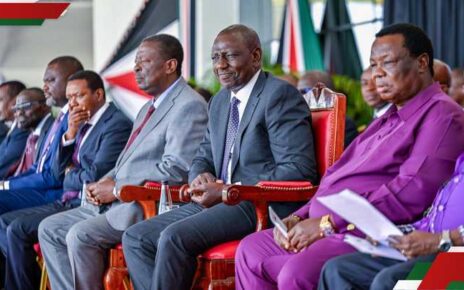The political landscape in both South Africa and Kenya has witnessed a surge of anti-government protests led by two charismatic opposition leaders, Julius Malema and Raila Odinga. While Malema is the leader of South Africa’s Economic Freedom Fighters (EFF) party, Raila Odinga leads Kenya’s Azimio la Umoja party. Both leaders have garnered attention for their unyielding stance against the ruling administrations and their fervent calls for political change. This essay explores the recent criticism of Raila Odinga by Julius Malema, their parallels as political challengers, and their approaches to bringing about political transformation in their respective nations.
- Julius Malema’s Critique of Raila Odinga’s Anti-Government Protests
At the EFF’s 10th Anniversary Rally in Soweto’s FNB stadium, Julius Malema openly criticized Raila Odinga for leading a series of anti-government protests in Kenya. He urged Raila to cease his actions, claiming that President William Ruto’s administration was democratically elected, and destabilization would only harm the people of Kenya. This unexpected criticism highlights Malema’s stance on upholding democratic mandates and promoting peace, even in the face of ideological differences.
- Malema’s Own Protest Actions in South Africa
Ironically, Malema has led protests against South Africa’s ruling party, the African National Congress (ANC), specifically targeting President Cyril Ramaphosa’s administration. The EFF’s mass protests, referred to as a national shutdown, were aimed at challenging the economic elite empowered by the government. This demonstrates Malema’s willingness to disrupt the status quo in pursuit of political change in his own country.
- Malema’s Call for Raila Odinga to Accept Election Results
In the past, Malema has also called out Raila Odinga for not accepting election results in Kenya and has encouraged him to prioritize the interests of the nation over individual loyalty. This stance aligns with Malema’s belief in the importance of respecting democratic processes and avoiding actions that could lead to social unrest and division.
- Parallels Between Malema and Raila
Political observers have drawn parallels between Malema and Raila, as both leaders fearlessly challenge those in power to bring about political change. They share a determination to voice the grievances of their supporters and advocate for alternative leadership options when they perceive a need for change. Despite their different countries and political contexts, both Malema and Raila have gained popularity by embodying the aspirations of marginalized populations seeking to shape the future of their nations.
- Malema’s Ambition for the Presidency
Julius Malema’s ambition to become South Africa’s president is well-known. He firmly believes that the EFF party continues to resonate with voters and has expressed his unwavering determination to lead the nation. This ambition reflects his conviction in the transformative potential of his leadership and the appeal of his party’s ideologies to a significant segment of the South African population.
- Support for President William Ruto’s Administration
Notably, Malema has expressed his support for President William Ruto’s administration in Kenya and sent congratulatory messages following his election victory in 2022. This support indicates Malema’s willingness to cooperate with like-minded political figures in neighboring countries and the recognition of shared goals in challenging established power structures.
- Raila Odinga’s Ties with South Africa’s Ramaphosa
On the other hand, Raila Odinga maintains strong ties with South Africa’s President Cyril Ramaphosa. The efforts to mediate between the Azimio la Umoja and Kenya Kwanza regimes signify a diplomatic approach to addressing political concerns and fostering regional cooperation.
Conclusion:
Julius Malema and Raila Odinga are two dynamic opposition leaders with strikingly similar approaches to political activism despite their differing national contexts. Both have demonstrated a willingness to challenge those in power and advocate for change, even if it leads to disruption. Malema’s recent criticism of Raila Odinga underscores his commitment to democratic principles and the promotion of peace in neighboring countries. As they continue to navigate their political landscapes, Malema and Raila remain key figures in the pursuit of political transformation and social justice in South Africa and Kenya, respectively.



